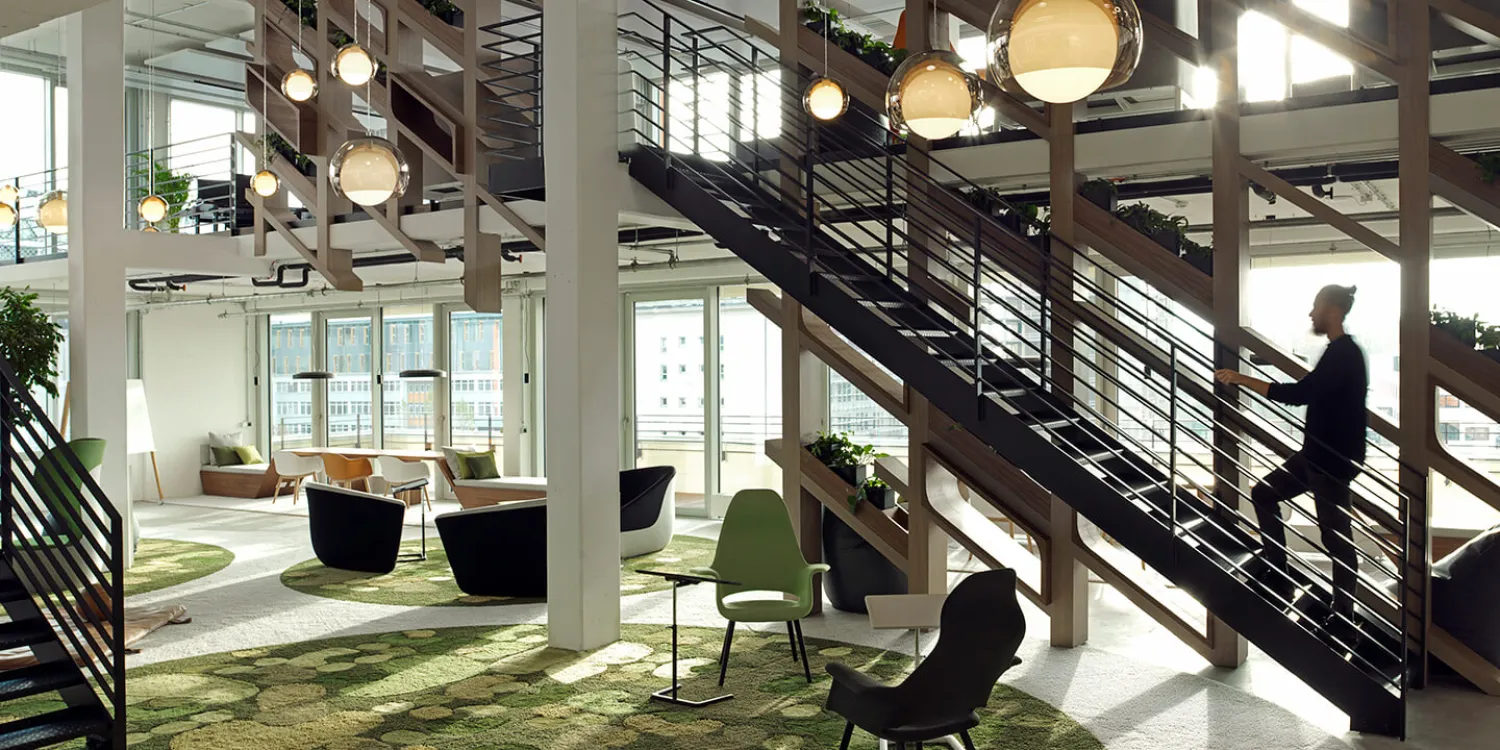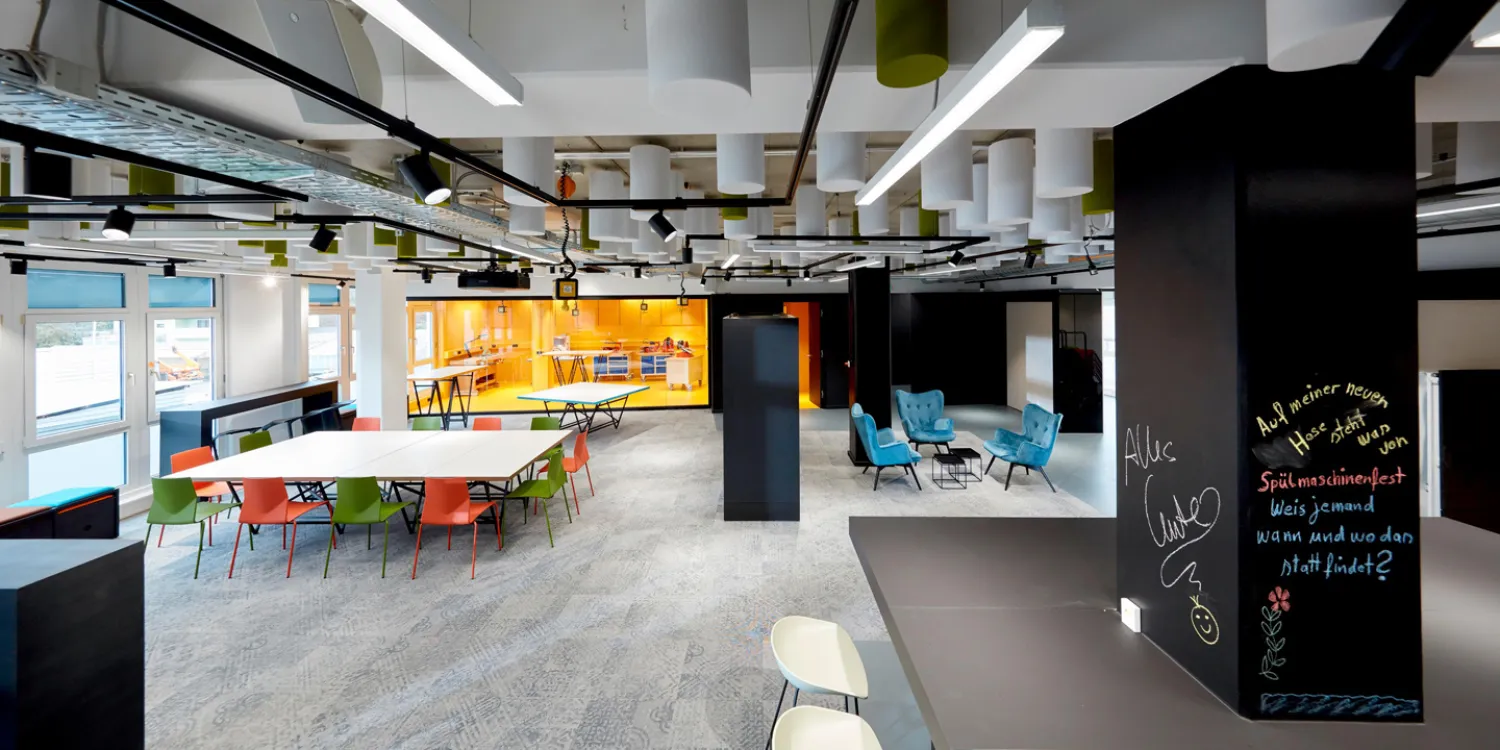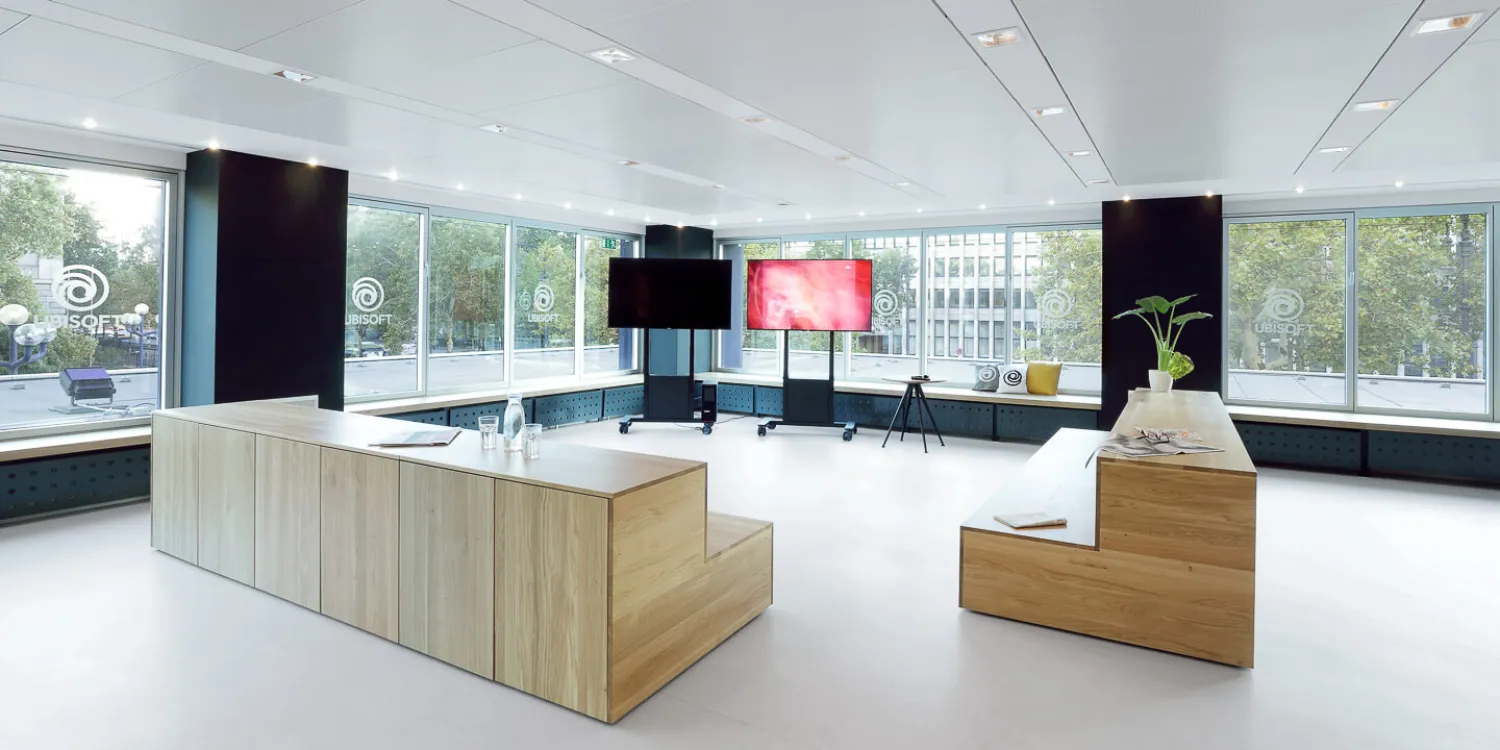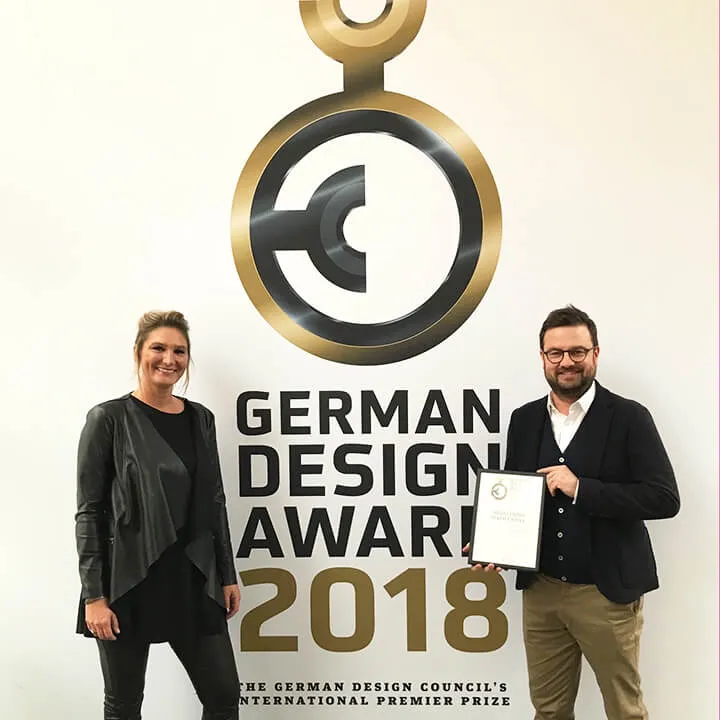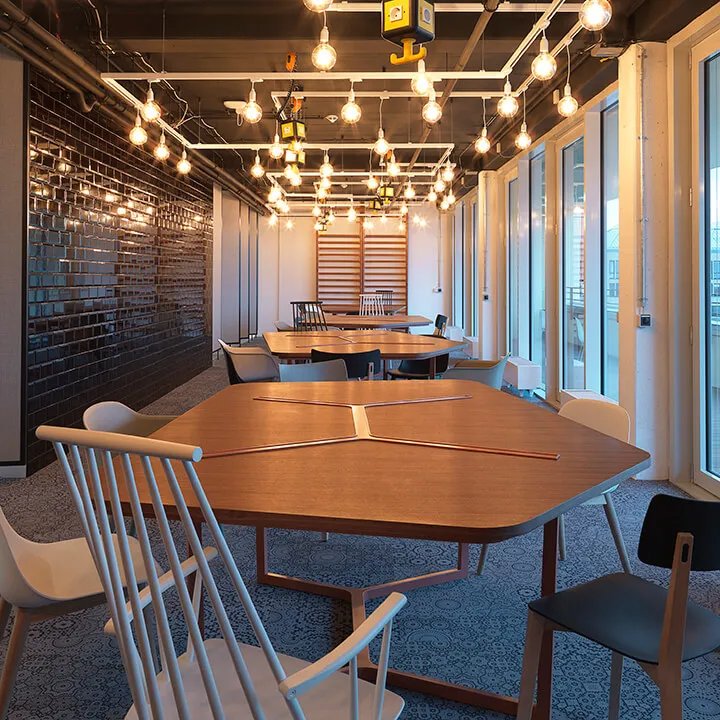Agile ways of working need new office concepts
Offices are in a state of constant evolution: with the development of agile forms of work, more and more companies are reorganising and redesigning their workspaces.
Munich, 8th March 2019 – Agile project management methods and approaches, such as scrum, design thinking, kanban or rapid prototyping, are increasingly altering the German office landscape. After the replacement of the square or rectangular office by the open-plan office in many sectors, open-space offices are now transforming into agile working environments which meet the requirements of the versatile and agile processes practised in different ways from company to company. „2019 sees the office world is in a state of radical upheaval. What appears to be above all creative and flexible on the surface, is the expression of an inner rethink“, Sven Bietau states. The architect is not only the managing partner of CSMM GmbH, but has also completed training as a Scrum Master. Under the credo "architecture matters", CSMM designs and implements new working environments in Germany and throughout Europe and has received several awards for its work.
According to a current study being carried out by Capgemini Consulting, the most agile companies in a sector are almost three times more successful than their competitors in a ten-year comparison. Word soon gets around. About eight out of ten managers believe the introduction of agile methods and structures makes sense. Seven out of ten judge their own company to be averagely agile already. However, only 14 percent of the radical change has managed to achieve a really agile organisation with fast decision-making processes.
The reason why agile working does not operate all over Germany is often not so much due to corporate organisation and the desire for speed, but to the workplace. Classically hierarchical structures are organised into silos that work individually, based on departments such as marketing. sales or product development. Whereas in agile structures, employees come together in networks and interdisciplinary teams which collaborate, take decisions and continue to develop. All teams meet with one another for exchanges about the milestones achieved, to divide the ongoing development into achievable goals and to start off on the next sprint again in small groups.
It calls for new work organisations, perspectives and office concepts. The need is for equal partners instead of service provider-customer relationships. Hierarchies must no longer be mapped in spatial terms, thus defining the mindset. "The classic square or rectangular office has had its day; because everyone has to be a leader and everyone has to be a worker. Specific functions are therefore no longer tied to fixed spaces, but rather activities.“, Bietau explains.
When new teams have to get together quickly, there is a need for places in the company which facilitate on-boarding and getting to know one another in a casual atmosphere – like kitchens or bars. Informal exchanges, where information which is important for agile projects flows, work better in those semi-public places which are specifically designed for that purpose.
sprints and reviews: so-called sprints and sprint reviews where teams compare their progress status are essential components of scrum. Spatial and resource planning changes as a result. In CSMM's experience, special spaces for review processes must be available and present from the outset.
The personal workspace may indeed move around in companies on a daily basis – however it is not obsolete. Aspects such as ergonomics, well-being, technical equipment or private folders are naturally still an issue. Room modules can allow these requirements to be met. Bietau: "Working in an agile way does not just mean setting up a sofa and three movable desks with writable room dividers"
It is more the case of anyone wanting to work in an agile way first having to analyse the work processes and need in themselves. Where and when do thinking activities such as brainstorming, research, meetings or conceptualisation take place? As a fundamental component of dynamic development, learning also needs visibility and retreat.
These insights must then be transferred into spatial planning – which like agile projects never really comes to an end. In our experience, new working environments, like projects with scrum or kanban, are always developing in a continuous and new way. Spaces and workplaces change with the projects. That sets new requirements in terms of the office architecture as well as the furniture, which has to be more flexible and modular.
Über CSMM (conceptsued° + Modal M)
CSMM versteht sich seit 16 Jahren als Beratungs- und Architekturunternehmen, das sich auf Büroimmobilien und Arbeitswelten im In- und Ausland spezialisiert hat. Mieter und Nutzer von Gewerbeimmobilien begleitet CSMM bei allen kreativen und rationalen Entscheidungen rund um das maßgeschneiderte Bürokonzept. Dazu zählen unter anderem die Beratung bei der Auswahl des Objektes, Organisationsanalysen, Arbeitsplatzstrategien, Um- und Einzug sowie die zukunftsfähige Neugestaltung des Arbeitsumfelds. Darüber hinaus begleiten die Experten auf Wunsch Change-Management-Prozesse. Für Entwickler, Vermieter und Eigentümer entwirft und steuert CSMM als Berater und Planer sämtliche baulichen und kommunikativen Prozesse für den Um-, Aus- oder Neubau von Gewerbeimmobilien. Dazu zählen Standortbewertung, architektonische Gesamtplanung und kreative Vermarktungsstrategien. Die Entstehung der Marke CSMM – architecture matters im Jahr 2018 ist eine konsequente Weiterentwicklung der zuvor getrennt arbeitenden Unternehmen conceptsued gmbh (gegründet 2003) und Modal M GmbH (gegründet 2008). Ziel ist es, die Kompetenzen beider Häuser ganzheitlich anzubieten. Das 60-köpfige, interdisziplinär und international zusammengesetzte Team von CSMM ist spezialisiert auf Büros, Hotels und Gastronomie jeder Größenordnung. Die Geschäftsführung obliegt Sven Bietau, Timo Brehme, Reiner Nowak und Malte Tschörtner. Neben dem Münchner Stammsitz agiert das Unternehmen auch mit Dependancen in Berlin, Frankfurt a.M. und Düsseldorf.
CSMM ist Mitglied des Expertenpools der „Deutschen Gesellschaft für Nachhaltiges Bauen – DGNB“ sowie des Zentralen Immobilienausschusses – ZIA „New Ways of Working“. Zudem im Forschungsbereich aktiv kooperiert das Unternehmen mit der Fakultät Architektur an der Ostbayerischen Technischen Hochschule und dem Institut für Sozialwissenschaftliche Forschung. Darüber hinaus fördert CSMM die „Gesellschaft für Immobilienwirtschaftliche Forschung – gif e.V.“ und engagiert sich in der „Werte-Stiftung“.
Pressekontakt
SCRIVO Public Relations
Ansprechpartner: Kai Oppel
Elvirastraße 4, Rgb.
80636 München
Tel: +49 (0)89 45 23 508-11
Fax: +49 (0)89 45 23 508-20
E-Mail: kai.oppel@scrivo-pr.de
Web: www.scrivo-pr.de
Unternehmenskontakt
CSMM GmbH
Werk 3, Atelierstraße 14
81671 München
Tel.: +49 (0)89 960 15 99-0
Fax: +49 (0)89 960 15 99-99
E-Mail: info@cs-mm.com
Web: www.cs-mm.com
